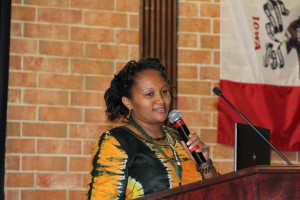By Anna Duran
The recipient of this year’s World Food Prize spoke in a presentation on Ankeny campus Oct. 16.
Dr. Charity Kawira Mutegi, 38, spoke to more than 300 people crowded into the auditorium in Building 6. The size of the crowd was entirely unexpected.
“We’ve violated fire codes,” said DMACC president Rob Denson. “There have never been more people in here.”
Mutegi was chosen as the recipient for the prestigious award due to her work in Kenyan corn fields, combating the growth of the carcinogenic fungal infection of corn known as aflatoxin.
In 2004, 125 Kenyans died as a result of one outbreak of aflatoxin. Research suggests that every person in Kenya has been exposed at least once.
“Things like food safety and nutrition are not abstract; these are things we experience on a daily basis. The impact of aflatoxin contamination in our country has been devastating and for me the loss of life was something we could control,” Mutegi said.
She spoke about her background in education, her work, and some topics relating to humanitarian concerns.
She was educated in boarding schools after being raised in childhood primarily by her father.
During college Mutegi searched for her career in different areas at Jomo Kenyatta University, trying everything from music to journalism before settling on food science.
“I tried everything in a struggle and battle with what I really wanted to do,” Mutegi said.
Her first job in her field was at a biscuit manufacturer because “I love biscuits, I love sweets.” The job, however satisfying to her stomach, was in quality control, and she found it dull.
“Ultimately I felt I wanted something less monotonous, and that is how I decided to progress into doing research,” Mutegi said.
She went to the University of Nairobi in Kenya and received her Master’s in Food Science and Technology.
“I must say that being a science person I was not very strong, so I knew at a young age that I would do something science based,” she said.
She received her Ph.D. in Nairobi, and began working in both corn fields and in labs battling the odorless, colorless aflatoxin.
Aflatoxin is the product of fungus species aspergillus flavus and aspergillus parasiticus, which are naturally occurring in the ground in hot humid climates. It affects maize and peanuts, two very important food staples in Africa.
Aflatoxin has been linked to cancer as early as the 1970s. It passes to humans from direct consumption of infected grains and consumption of animal products where the animals have been fed contaminated grains.
“Forty percent of the maize [corn] we consume has been found to be contaminated. One out of 83 households is affected by cancer in Kenya. These statistics are shocking,” Mutegi said. “These are things that we have solutions to.”
The average Kenyan consumes about 400 grams of corn per day. An American, by contrast, eats approximately 10 grams per day, and usually highly processed. Large-scale manufacture of corn products is not feasible in Africa, and so the crops are processed traditionally and manually, dried on the ground, where the contamination occurs.
Dr. Mutegi, with the help of the USDA, has implemented a way to combat the carcinogenic fungi. Other non-toxic species are introduced to the soil where crops are planted. These non-toxic varietals out compete a. flavus and a. parasiticus, so the molds do not grow.
The packages given to farmers include these implementations, which last for several seasons, and the farmers are also educated on clean crop drying, using tarps as barriers and storing the grains in proper containers.
Mutegi’s career highlight of receiving the World Food Prize and thereby potentially saving the lives of thousands of Africans is as impressive as it was unlikely.
“People often ask, ‘Why don’t you go into banking?’ Families with beautiful daughters don’t want them in agriculture where they’ll get dark and dirty,” Mutegi said.
Mutegi also drew attention to the disparity in girls’ education.
“We marry off our daughters … it has almost become a commercial transaction … so they are not expected to get an education. They are not meant to go to school,” Mutegi said.
Despite the odds stacked against her, she has made an incredible impact for the better in her nation, on her continent, and in the world.
“Do not give excuses to settle for less. This is your time. Don’t wait till you’re fifty to start your goals. There is no substitution for hard work. You can sleep when you are dead.”







Comments